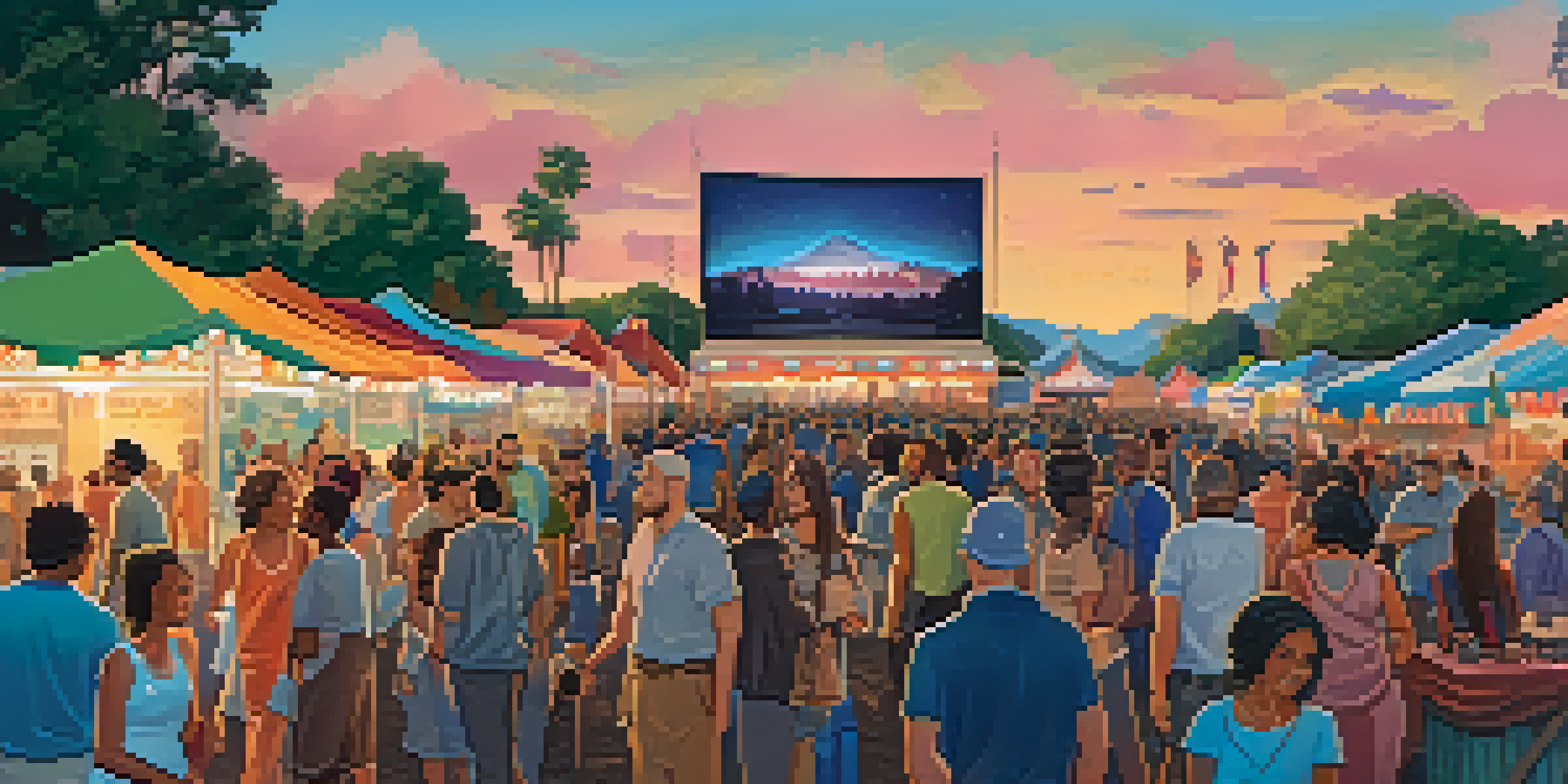Showcasing Indie Films: Film Festivals and New Talent Discovery

The Importance of Film Festivals in Indie Cinema
Film festivals play a crucial role in the indie film landscape, providing a platform for filmmakers to showcase their unique voices. These events gather industry professionals, critics, and audiences, creating a vibrant space for networking and exposure. For many indie filmmakers, a festival debut can be a turning point in their careers, offering invaluable feedback and connections.
Film festivals are the perfect place to showcase avant-garde cinema and to discover new talents.
Consider the Sundance Film Festival, which has launched the careers of countless directors and actors. This festival not only showcases films but also fosters an environment where creativity thrives. The buzz generated around indie films at festivals often leads to distribution deals and wider audiences, elevating the projects that might otherwise go unnoticed.
Moreover, festivals celebrate diversity in storytelling, giving a voice to underrepresented communities. They often feature international films, expanding the cinematic landscape and enriching viewers' experiences. As such, film festivals are not just events; they are essential catalysts for the indie film community.
Spotlighting Emerging Talent at Festivals
One of the most exciting aspects of film festivals is their focus on new talent. Many festivals have dedicated sections for debut filmmakers, highlighting fresh perspectives that challenge mainstream narratives. This emphasis on discovery allows audiences to experience innovative storytelling that reflects current social issues and diverse cultures.

For instance, the Cannes Film Festival has a prestigious section called 'Un Certain Regard' that showcases innovative works from new filmmakers. This spotlight not only attracts critical attention but also opens doors for these filmmakers to collaborate with established industry veterans. Such opportunities are crucial for nurturing the next generation of cinematic storytellers.
Film Festivals Boost Indie Careers
Film festivals provide vital platforms for indie filmmakers, offering exposure, feedback, and networking opportunities that can significantly impact their careers.
Additionally, the networking opportunities at festivals can be game-changing for emerging talent. Many filmmakers leave with more than just experience; they often find mentors or partners who help propel their projects forward. By fostering these connections, festivals contribute significantly to the sustainability and growth of indie cinema.
The Role of Audience Engagement in Festivals
Audience engagement is a cornerstone of film festivals, providing filmmakers with immediate feedback and connections. Viewers have the chance to interact with creators during Q&A sessions, which can deepen their understanding of the film's themes and production. This interaction not only enhances the viewing experience but also fosters a community around indie cinema.
The power of cinema is to take us where we have never been, to show us the world through different eyes.
Take the Toronto International Film Festival, known for its enthusiastic audiences that often participate in discussions after screenings. This engagement helps filmmakers gauge reactions and refine their future projects based on audience insights. The excitement generated during these interactions can also lead to word-of-mouth promotion, crucial for indie films with limited marketing budgets.
Furthermore, festivals often include panels and workshops that invite audience participation. These events can demystify the filmmaking process and inspire attendees, potentially igniting a passion for film in future creators. In this way, festivals serve as a bridge between filmmakers and the public, creating a shared appreciation for indie films.
How Festivals Shape Indie Film Trends
Film festivals are often a reflection of the current cultural climate, influencing trends in indie filmmaking. They showcase themes that resonate with audiences, from social justice to environmental issues, which in turn inspire other filmmakers to explore similar narratives. This cyclical relationship between festivals and filmmaking helps shape the industry's direction.
For example, in recent years, there has been a noticeable rise in films addressing mental health and identity. Festivals like South by Southwest have been at the forefront of highlighting such films, encouraging broader conversations around these topics. As trends emerge from festival circuit films, they often find their way into mainstream cinema, illustrating the impact of indie storytelling.
Emerging Talent Shines at Festivals
Festivals spotlight new filmmakers, allowing them to present innovative storytelling that addresses current social issues and diverse cultures.
Moreover, festivals can spotlight new technologies and storytelling techniques, pushing the boundaries of how stories are told. The rise of virtual reality experiences at festivals showcases how these events can embrace innovation and inspire filmmakers to experiment. By setting the stage for these trends, festivals play a pivotal role in the evolution of indie cinema.
Navigating the Festival Circuit: Tips for Filmmakers
For filmmakers, navigating the festival circuit can be daunting but also rewarding. Understanding the unique character of each festival is crucial; some focus on specific genres or themes, while others may prioritize regional works. Researching these nuances can help filmmakers choose the right festivals that align with their film’s vision.
Submitting to festivals typically requires a well-prepared strategy, including crafting a compelling submission package. Filmmakers should highlight what makes their work unique, whether it’s a groundbreaking narrative or innovative cinematography. A strong, authentic pitch can significantly increase the chances of being selected.
Additionally, networking is key once a film is accepted into a festival. Filmmakers should proactively engage with other attendees, attend panels, and participate in discussions. Building relationships within the festival community can lead to future collaborations and opportunities that extend beyond the festival circuit.
The Impact of Virtual Festivals on Indie Film Distribution
The rise of virtual film festivals has transformed how indie films are distributed and viewed. With the COVID-19 pandemic prompting many festivals to go online, filmmakers found new ways to reach audiences without geographical limitations. This shift has not only broadened access but also allowed films to gain visibility in a crowded market.
Virtual festivals often incorporate streaming platforms that allow viewers to watch films from the comfort of their homes. This convenience can lead to increased viewership, as audiences are more likely to check out a film that doesn’t require travel. For filmmakers, this means reaching wider audiences and potential distributors who might discover their work online.
Diversity Enriches Indie Cinema
Indie film festivals champion diverse voices, showcasing stories from underrepresented communities that promote empathy and understanding among audiences.
However, the virtual format also presents challenges, such as reduced in-person networking opportunities. Filmmakers must adapt to digital engagement and find creative ways to connect with audiences and industry professionals. As the landscape evolves, both filmmakers and festivals are learning to balance the benefits of virtual exposure with the intimate connections fostered in physical spaces.
Celebrating Diversity: Indie Films at Festivals
Indie film festivals are increasingly becoming champions of diversity, showcasing a wide range of voices and stories that reflect our complex world. By prioritizing films from underrepresented communities, festivals contribute to a richer tapestry of narratives in cinema. This commitment not only enriches the viewing experience but also promotes understanding and empathy among audiences.
For instance, the African American Film Festival Releasing Movement focuses on elevating Black filmmakers and their stories. By providing a platform for diverse voices, festivals help challenge stereotypes and broaden the scope of storytelling in film. This celebration of diversity is essential for fostering a more inclusive industry that resonates with all audiences.

Moreover, highlighting diverse filmmakers often leads to collaborations that transcend cultural boundaries. Such interactions can inspire innovative storytelling methods and fresh perspectives, pushing the indie film landscape in exciting new directions. Festivals that embrace diversity are not only changing the narrative but are also paving the way for a more equitable future in cinema.